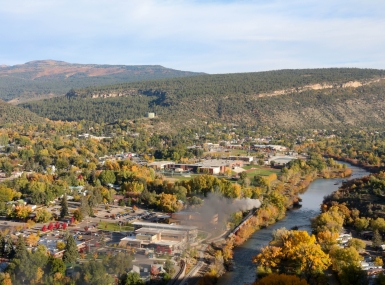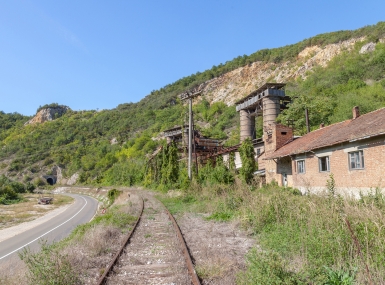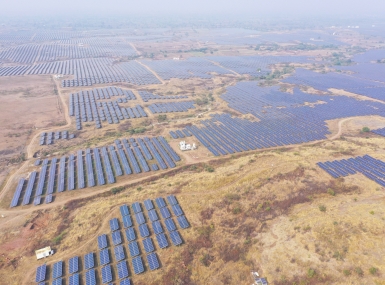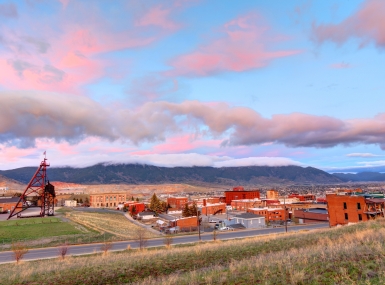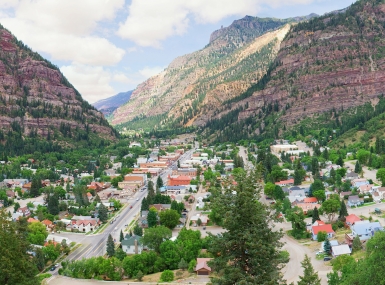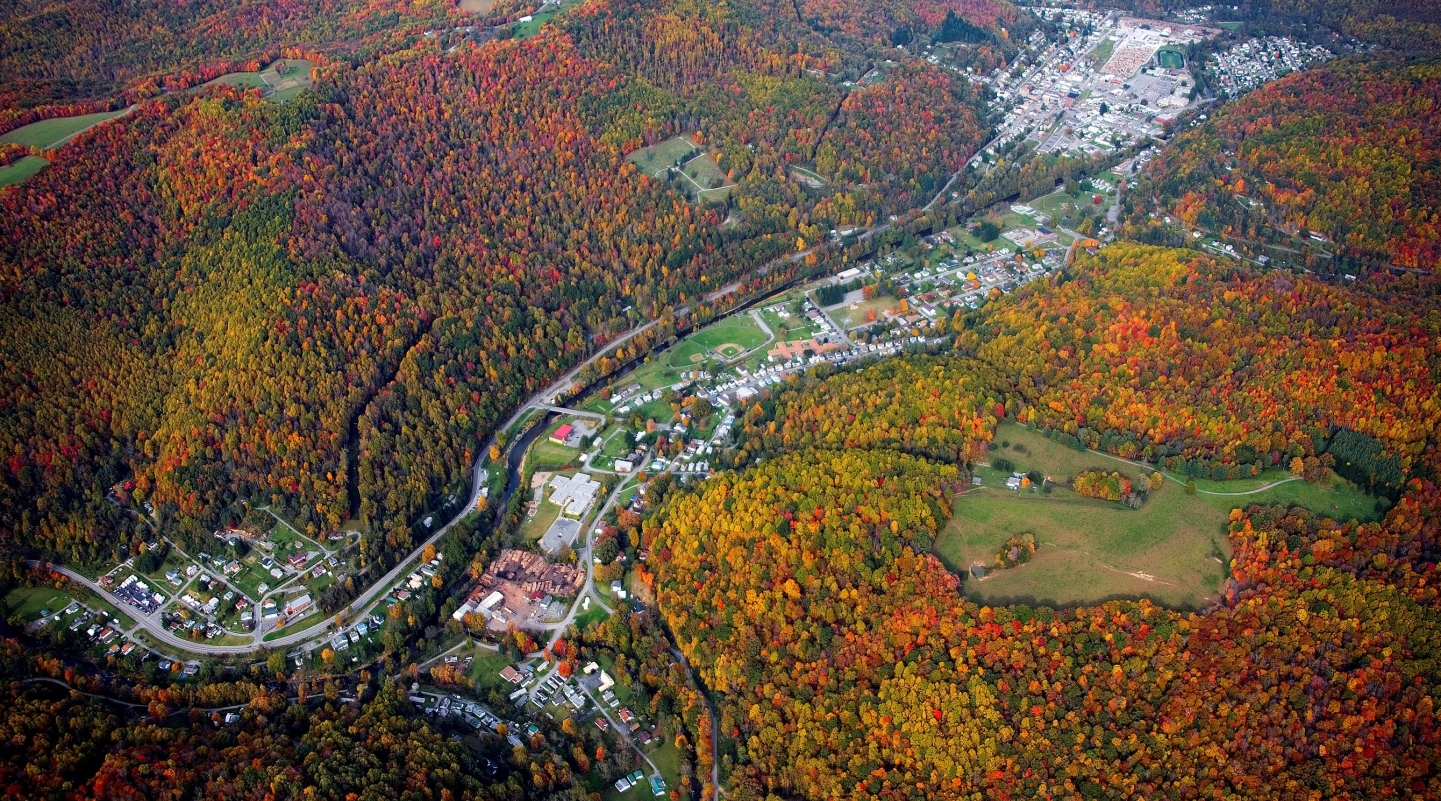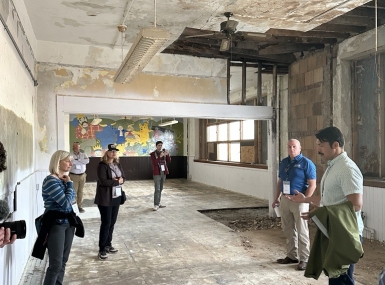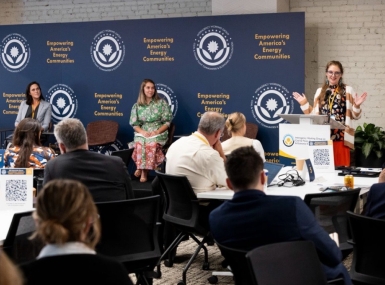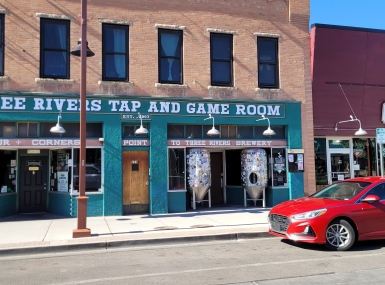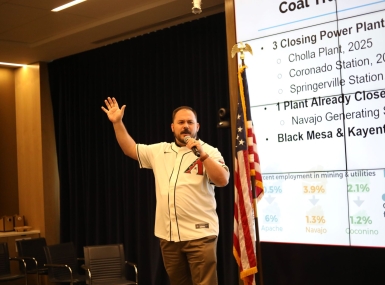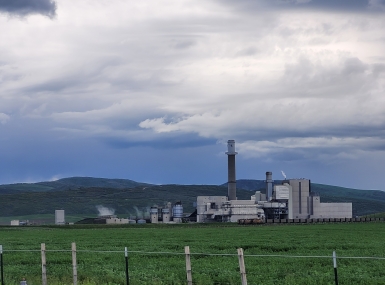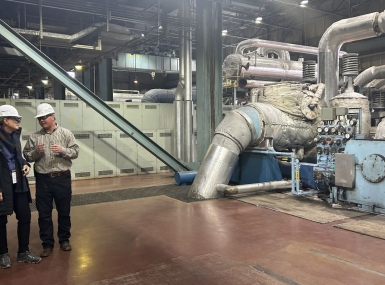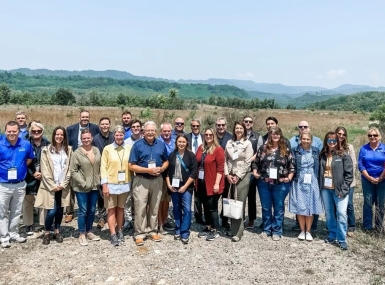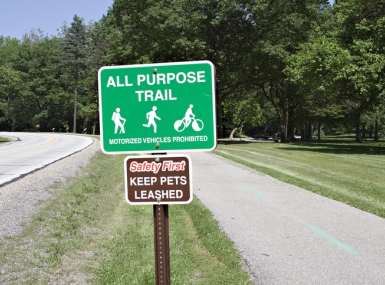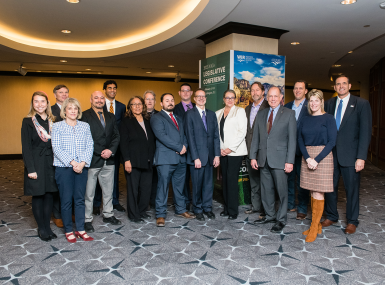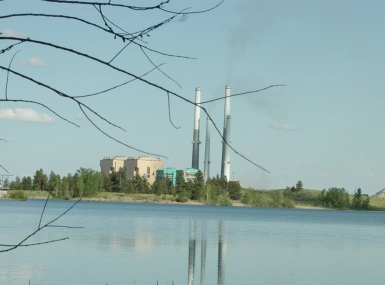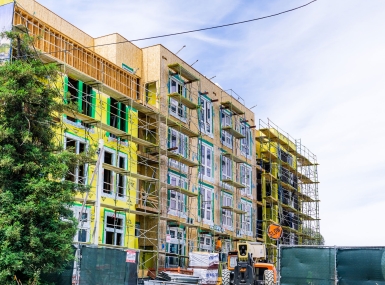Building Resilient Economies in Coal Communities
Coal communities seeking to revitalize and diversify their economies

NACo's Building Resilient Economies in Coal Communities (BRECC) initiative serves coal communities seeking to revitalize and diversify their economies. Supported by the U.S. Department of Commerce Economic Development Administration (EDA), BRECC is a knowledge-sharing community of practice. BRECC's activities connect coal communities across the nation, support local leaders and build economic development capacity. As a result, BRECC prepares communities to advance new approaches and projects for economic diversification.
BRECC Components
The BRECC National Network is an open forum and peer network connecting coal community leaders representing local governments, regional organizations, community nonprofits, education and workforce providers, utilities, private business and other local stakeholders. The BRECC National Network convenes bi-monthly for virtual learning sessions featuring issue-specific presentations, peer breakout discussions, community case examples, and critical funding and resources available to coal communities.
All coal community stakeholders are welcome to join the BRECC National Network. To become part of the National Network, sign-up here.
To join the BRECC Online Community Platform, sign up here. Login to the site here.
BRECC's Commitment Coalition
BRECC’s Commitment Coalition is a peer network of 20 coal community leaders, who deepen their knowledge of economic resilience through national subject matter experts as well as their counterparts’ community-based experiences. Selectees represent local, regional and state government entities as well as the nonprofit and private sectors. Over two years, the selected leaders will attend in-person site convenings and virtual workshops and share their experiences through BRECC’s national storytelling platform.
NACo proudly announces the following Commitment Coalition members and their corresponding coal community counties and states:
1. Stephen Allen, Liaison, South Lincoln County Economic Development Corporation, Lincoln County, Wyo.
2. Jim Atchison, Executive Director, Southeastern Montana Development Corporation, Mont.
3. Stuart Clason, Regional Growth Director, Utah Regional Growth Association, counties of Carbon and Emery, Utah
4. Dr. Sandra Curd, Promise Zone Coordinator, Kentucky Highlands Investment Corporation, USDA Rural Partners Network, counties of Bell, Clay, Harlan, Knox, Leslie, Letcher, Perry and Whitley, Ky.
5. Jenna Draper, Economic Development Director, Six County Association of Governments, counties of Juab, Millard, Piute, Sanpete, Sevier and Wayne, Utah
6. Sharon Fain, Vice President, PacifiCorp/Rocky Mountain Power, counties of Lincoln, Converse, Sweetwater and Campbell, Wyo. and Emery County, Utah
7. Cora Gnegy, Tourism Director, Giles County, Va.
8. Hon. Steve Henry, Judge/Executive, Webster County, Ky.
9. Hon. Marc Kiehna, Commissioner, Randolph County, Ill.
10. Hon. Bryan Davis, Commissioner, Scioto County, Ohio.
11. Hon. Dan Mosley, Judge/Executive, Harlan County, Ky.
12. Will Payne, Managing Partner of Coalfield Strategies, counties of Bland, Buchanan, Carroll, Dickenson, Grayson, Lee, Russell, Scott, Smyth, Tazewell, Washington, Wise and Wythe, Va.
13. Councilperson Gabe Pena, Fayetteville Town Council, Fayetteville County, W.Va.
14. Hon. Greg Puckett, Commissioner, Mercer County, W.Va.
15. Nicole Smude, Economic Development Coordinator, City of Becker, Minn.
16. Dr. Mark Sarver, Associate Professor of Business and Workforce Learning, Glenville State University, USDA Rural Partners Network, counties of Braxton, Calhoun, Clay, Gilmer, Nicholas, Roane, Webster and Wirt, W.Va., and Mayor of the City of Glenville, W.Va.
17. Hon. Tammy Tincher, Commissioner, Greenbrier County, W.Va.
18. Hon. Sean Swope, Commissioner, Lewis County, Wash.
19. Hon. Melody Villard, Commissioner, Moffat County, Colo.
20. Carla Vita, Director of Energy Transition, Minnesota Department of Economic Development, counties of Chippewa, Otter Trail, St. Louis, Cook, Sherburne, Itasca and Washington, Minn.
What do Coalition leaders do?
Selected leaders participate in:
- Travel to four peer exchange site visits hosted by a Coalition community and designed to highlight successful programs and projects for economic diversification
- A monthly virtual learning series with subject matter experts featuring strategies for recovery from coal's decline, including topics on investing and funding streams, workforce training, economic planning opportunities, community development strategies, broadband project management, federal agency resources, automation and employment and COVID-19 recovery
- Peer exchanges where leaders will be paired with a community from a different region to share advice and generate new ideas
- Public engagement activities to share learning and strategies with home communities
- A storytelling campaign to share local experiences and initiatives with a national audiences, including a blog post on the application of key concepts
- Cross-network integration mixers where leaders will have the opportunity to connect with other communities engaged in economic diversification efforts, such as textile communities
- The broader BRECC National Network virtual convenings with local, regional, state and federal coal community stakeholders, and
- In-person workshops at the BRECC Summit taking place at the end of the program period
Benefits of the Coalition
Selected leaders:
- Gain an increased understanding of economic diversification strategies within coal communities and methods for local implementation
- Discover new economic development projects, resources and approaches for replication within their community
- Build relationships with and learn from coal community leaders across U.S. regions, and
- Connect and share resources through the broader BRECC National Network's virtual convenings with local, regional, state and federal coal community stakeholders.
BRECC's Action Challenge
BRECC's Action Challenge is a technical assistance program that empowers local leaders to identify and advance projects for economic revitalization and diversification. The Action Challenge connects community teams with economic development experts from NACo’s BRECC partners the West Virginia Community Development Hub, EntreWorks Consulting and Community Builders. For one year, the selected teams receive one-on-one coaching to develop a locally-driven economic diversification strategy. On February 9, 2024, the eight community teams as part of the BRECC Action Challenge Cohort 1 presented their locally-driven economic diversification strategies to federal and policy partners. Read more about their economic diversification plans below.
NACo proudly recognizes the following community teams participating in the first Cohort of BRECC’s Action Challenge:
Cumberland Plateau Planning District Commission, Va.: In southwestern Virginia, the Cumberland Plateau Planning District Commission is a regional Economic Development District serving the counties of Buchanan, Dickenson, Russell and Tazewell. With a regional approach, this team seeks to grow economic resilience through entrepreneurship and business development strategies. Read their economic diversification plan here.
City of Richwood, Nicolas County, W.Va.: In central West Virginia, the City of Richwood is experiencing population loss tied to the decline of the local coal industry. Building on natural assets, this team looks to expand its outdoor recreation economy with a special focus on a local trail network. Read their economic diversification plan here.
Counties of Apache, Coconino and Navajo, Ariz.: In Northern Arizona, the counties of Apache, Coconino and Navajo face the closure and decommissioning of several coal-fired power plants. Collaborating across county borders, this team will coordinate planning to create a complimentary, shared strategy for economic diversification. Read their economic diversification plan here.
Floyd County, Ky.: In eastern Kentucky, Floyd County has seen a decline in coal production over the past three decades and recent flooding has exacerbated economic hardships. Led by a newly created long-term recovery group, this team will pursue opportunities in outdoor and cultural tourism as well as residential attraction. Read their economic diversification plan here.
Pike County, Ind.: In southwestern Indiana, Pike County’s employment and tax base are closely tied to a coal-fired plant slated to be decommissioned. This team will create a local strategy around business attraction and workforce retention goals. Read their economic diversification plan here.
Perry County, Ohio: Perry County is facing the impact of its last two mines closing. This team will advance planning for placemaking economic development strategies. Read their economic diversification plan here.
Northwest Colorado Development Council, Colo.: In Northwest Colorado, the Northwest Colorado Development Council serves the counties of Rio Blanco, Moffat and Routt, which faces the impending closure of two coal-fired power plants. In partnership with a regional community college, this team will expand on strategies for advancing energy initiatives. Read their economic diversification plan here.
San Juan County, N.M.: In northwest New Mexico, San Juan County is experiencing the closure of one coal-fired power plant and faces the impending closure of another. In partnership with Four Corners Economic Development, this team will advance strategies for workforce redevelopment and business expansion. Read their economic diversification plan here.
Learn more about the seven communities competitively selected for Cohort 2 of the BRECC Action Challenge here. The 2024 BRECC Action Challenge communities are:
Campbell County, Wyo.: In northeastern Wyoming, Campbell County is recognized as a leading producer of coal within the United States. Planning with county stakeholders, this team will pursue economic diversification strategies connected to industry expansion and energy production.
Counties of Pendleton and Grant, W.Va.: In northeastern West Virginia, the counties of Pendleton and Grant recently formed a joint economic development entity, the Seneca Rocks Regional Development Authority. Collaborating across county borders, this team will pursue strategies to offer training to displaced coal workers and expand rural business development.
Forest County, Pa.: In northwest Pennsylvania, Forest County is experiencing declines in employment connected to the closure of a coal mine and related coal-related industries. Partnering with the local school system and regional council of governments, the Forest County team will pursue strategies to expand and diversify employment opportunities across the county.
Counties of Mason, Tazewell and Peoria, Ill.: In central Illinois, the counties of Mason, Tazewell and Peoria have been impacted by the closure of three coal-fired power plants across the region. Led by the Greater Peoria Economic Development Council, this team seeks to pursue regional economic diversification strategies related to workforce recovery and energy development.
Counties of Montrose and San Miguel, Colo.: Located in the west end of southwest Colorado, Montrose and San Miguel Counties lost half of their property tax base and many residents due to the closure of power plant and local mining operation. Led by the West End Economic Development Corporation, this team will work to revive three mining towns through place-based strategies and business expansion opportunities.
Monroe County, Ga.: Located in central Georgia, Monroe County’s employment and tax base are closely tied to a coal-fired power plant slated to be decommissioned. This team looks to learn from fellow coal-impacted communities to implement economic resiliency strategies and pursue opportunities to diversify power generation.
Somerset County, Pa.: In the southwest corner of Pennsylvania, Somerset County is currently home to 18 mining operators. Downturns in the coal industry have resulted in job loss and adverse impacts on local businesses, specifically suppliers of mining equipment. This team seeks to support impacted employees and businesses by pursuing strategies to attract new and retain existing companies.
Watch Video
Learn about the impacts of the BRECC Coalition Leadership Network!
Sign Up for the BRECC National Network
To become part of the National Network and receive updates on all BRECC programming, sign up using the form.
|
|

Support
BRECC is operated by the National Association of Counties using federal funds under award ED22HDQ3070080 from the Economic Development Administration, U.S. Department of Commerce. The statements, findings, conclusions, and recommendations are those of the author(s) and do not necessarily reflect the views of the Economic Development Administration or the U.S. Department of Commerce.

